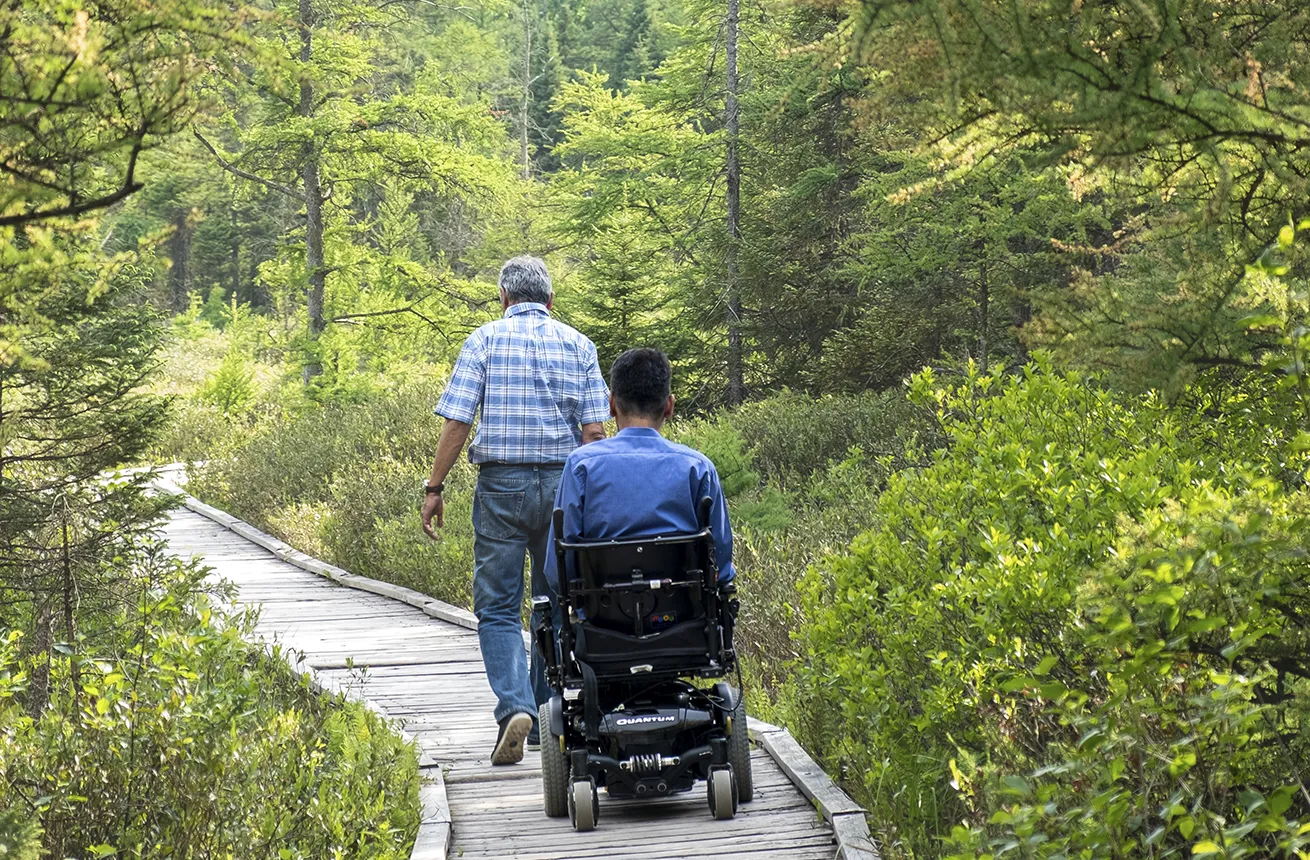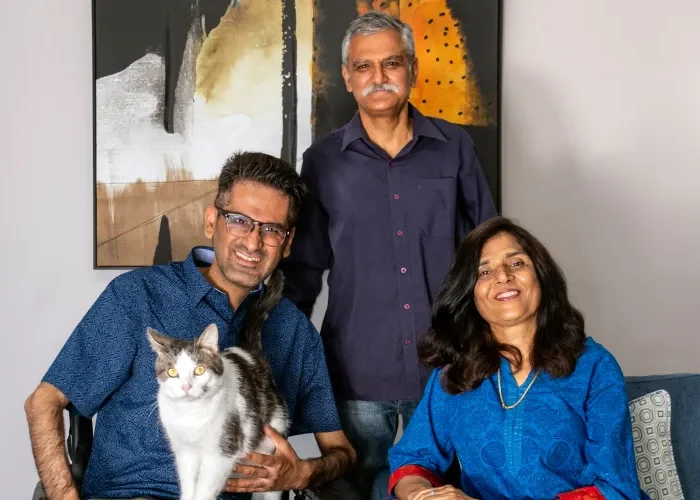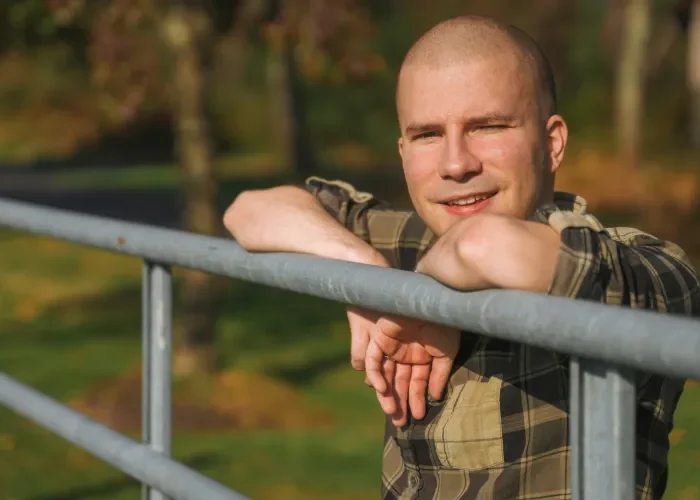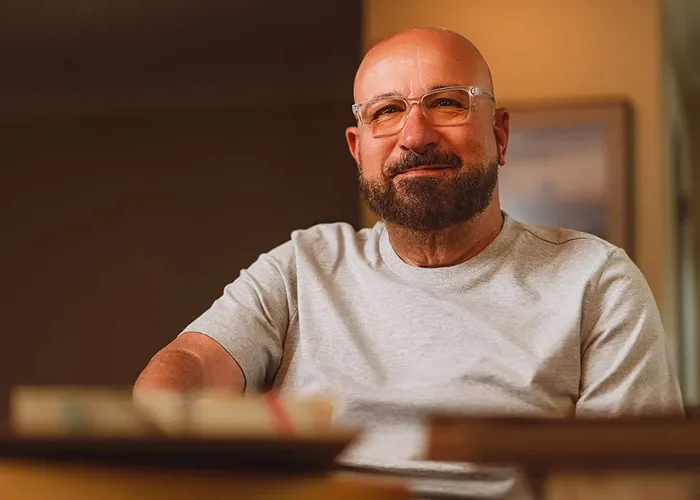Pratik never tires of a good vista, and high-up places have enticed him for years. The vaster the view the better, whether of distant snowy peaks, or a bird’s eye view of an intricate cityscape. He pushes the elevator button for his floor, and the silver doors close. He begins ascending. The building where he works, at 25 stories tall, is a fixture on the skyline of London, Ontario. “We are not really known for our skyscrapers,” Pratik jokes. “But my company happens to be in the tallest building in the whole city.” The bell rings and he zips out from the elevator on his power wheelchair to show off one of the perks of his office job.

Through the large glass panes, Pratik gazes out over the city that has become his home for the last eight years. “It’s the city where I became an independent adult and got my first job,” he explains. Pratik first moved to London to start his master’s degree in Software Engineering at Western University. “It is a very manageable city,” he says. “It’s not too big and there is good accessibility infrastructure.” However, for him, the lakeside plains of Ontario are a far cry from the majesty of his native topography—the Himalayas of Northern India.
Pratik hails from Dharamshala, a small city nestled in the Kangra Valley, almost 5,000 feet above sea level. The city hosts a large population of Tibetan refugees and functions as a gateway to trekking the Himalayas. Pratik and his family explored the region near the Great Himalayan National Park, once hiking to scenic Serolsar Lake, over 10,000 feet high, in the pouring rain. From a young age, these peaks and passes inspired Pratik to get out and explore the world. “I had hoped one day to hike to the base camp at Mt. Everest in Nepal,” he remembers. “I wanted to go to South America and bike the Andes from Colombia to Chile… There have been a lot of dreams that I’ve had to accept probably won’t happen in my lifetime.”
These difficult realizations are woven into Pratik’s daily reality of living with Becker’s muscular dystrophy (BMD), an X-linked genetic disorder in which muscles lack necessary proteins, gradually hindering their strength over the course of several decades. While the disease advances slower than Duchenne muscular dystrophy (DMD), it shares much of the eventual prognosis. There are few available treatments and no cure, but this has not stopped Pratik from pursuing a fulfilling life as a software engineer with an unquenchable thirst for travel. Always with his eyes on the horizon, Pratik navigates the changes in his world with ingenuity and no lack of hard work.
As a boy, Pratik had difficulty getting up from the ground. Rupali, his mother and a career pediatrician, recognized this as Gowers’ sign and suspected her son might have muscular dystrophy, but an orthopedist attributed it to other causes. However, at nine, Pratik, who had continued to show symptoms, went to New Delhi for genetic tests. His mother’s intuitions had been correct, and he was diagnosed with Becker. Pratik entered his adolescent years forced to manage physical decline occurring at a yet-unknown rate.
“As my ability to walk decreased, I stayed more at home,” he recalls. “I was hesitant to use a wheelchair… I was kind of embarrassed to go around in a wheelchair in front of my friends.” Pratik went to great lengths to appear normal and avoid the potential hazards of promenading in large groups. “During high school, I would go early in the morning, sit at my desk, and not leave until school ended.”
A great moment of realization was upon him: to find success and happiness, he must both accept his condition and work twice as hard to live a life compromised but no less purposeful. His main obstacle lay in the lack of accessibility infrastructure in India. “Accessibility was a new idea there,” he says. “There were no laws or standards for anything.” Pratik knew good education and commitment to a technical, but not physically demanding, field would be his only chance of flourishing in a society where his needs to be able to live independently would not be met. “Because of the lack of infrastructure, many disabled people in India don’t venture into higher education to seek better employment,” he laments. “I was lucky and a little privileged.”
By the time he began his undergraduate studies in engineering at National University of Technology in Hamirpur, Pratik couldn’t walk more than 20 paces at a time. “The campus was really spread out, and I had classes in all different departments,” he recalls. It was then that Pratik started to see the advantages and the pending necessity of a wheelchair. Setting aside his reservations, he began traversing the campus with one.
“There were stairs everywhere,” says Pratik, laughing in retrospect at the absurd lack of forethought. “There was only one bathroom on campus where my wheelchair would fit so I had to plan my loo breaks really well. I stopped drinking water during the day.” Many of his classrooms were up several flights of stairs and none of the buildings had elevators. Pratik had no other option but to ask for help. Luckily for him, his friends never hesitated to carry him, wheelchair and all, up several flights of stairs so that he could attend class. “I’m amazed that they agreed to do that,” he says wistfully.
His social circle proved to be a lifesaver. Pratik was not only able to make it to class on time, but also got a chance to share his perspective on the world. “I remember our trip to Shimla,” Pratik reminisces fondly. Surrounded by beautiful architecture, it was a chance for him to share the city where he spent his high school years, helping solidify a bond with his group of friends. Camaraderie proved as vital as good accessibility, and one could somewhat make up for a lack of the other. To this day, Pratik remains in touch with many of his friends from college despite the fact they are now spread out all over the world.
As Pratik graduated from university, he and his parents came to the conclusion that they would need to turn their eyes to new horizons. “It would’ve been really hard for me to work and live independently anywhere in India,” says Pratik. “I had to depend on others to do the smallest things in my life.”
In what felt like a natural conclusion, Pratik’s family made the difficult decision to emigrate. But where? The US was Pratik’s top choice because of the shared language, schools, and extended family already there, but due to stringent immigration policies, only he alone could go there on a student visa. “That wouldn’t work,” says Pratik, whose parents needed to be a part of the picture.
Instead, through a process of elimination, Pratik’s family decided to relocate to Canada, where they could all legally move, and Pratik applied to graduate school there. Rajiv, his father, took a sabbatical from work as an electrical engineer to help with the move. He stayed for a couple months as everyone settled in before returning to India to continue providing income.
Pratik landed in Ontario and for the first time in his life took advantage of an accessible infrastructure decades in the making. He began utilizing an accessible public transit system and didn’t have to worry nearly as much about where to find an accessible restroom. “Even if I cannot be totally independent in Canada, I can be more independent than I was in India,” he says. He also got his first motorized wheelchair, which greatly increased the distances he could travel on his own. His university was dutifully accommodating and made sure Pratik could safely get to all classrooms on time. The days of being precariously lifted up stairs had come to an end.
Pratik excelled in his studies, finishing what is normally a two-year program in a year-and-a-half and moved swiftly into the job market as a software engineer. “I wish I could be working on issues of accessibility,” says Pratik. He accepts that software engineering was the most logical choice for him, considering his declining physical strength and ability. “I enjoy being able to work at a decent salary,” he says, “to be able to afford a house, a car, being able to go out and have a good social life after work—and being able to travel.”
Pratik’s desire for travel has grown dramatically as he has gained considerable confidence navigating all sorts of situations. Maximizing his limited vacation time, he has ventured to many major destinations in North America—New York City, Chicago, Miami, San Francisco, and Vancouver, just to name a few. “In 2019, I got my Canadian citizenship,” he proclaims. With a Canadian passport in hand, Pratik planned one of his dream vacations to Europe to meet an uncle there in 2020. Unfortunately, the COVID pandemic cancelled his trip, but not his enthusiasm. “Travel is the one thing that keeps me refreshed,” he comments. “I look forward to it with a passion.”

For the past 15 months, Pratik has worked mostly from home, so visiting the office is actually sort of a treat. He wheels through the open floor plan reminiscing about fun times he’s spent with co-workers. “We didn’t use cubicles,” he remarks. “So, we were hanging out a lot together in the office.” Pratik misses the social stimulation that was once a regular part of his work life. “My workplace has been quite accommodating for my accessibility needs,” he adds. They provided an accessible desk and altered the bathroom to make his life easier—although these things have sat vacant for most of the last year-and-a-half.
Working from home hasn’t meant shorter days. “It’s affecting my health a little bit,” Pratik admits. “If I wasn’t working and had time to do therapy and exercises, I’d be in better shape physically.” In the years since moving to Canada, Pratik’s physical abilities have continued to decline due to Becker’s—including difficulty using his arms and hands. “I figure I have at least another 10 years until I have to worry about some of my internal organs.” The slow, but destructive path of Becker remains a constant presence, looming in the background and blurring his future. Pratik accepts that a difficult road lies ahead, but tries to maintain a good attitude.
Now, he spends his days with his newest co-worker: his kitty, Frodo. “Whenever I feel low, I hang around with him and I forget all of my negative feelings,” he says. “He distracts me from my worries and stresses.” Frodo is also sort of famous. The photogenic feline has made the rounds on Instagram (@furrodo), where Pratik has garnered followers through the proud internet tradition of cat-worship. “Posting photos has become sort of a new passion of mine,” says Pratik. Instagram has allowed him to share more of his perspective on the world, as a wheelchair user who loves to travel. His non-cat Instagram handle (@wheelogger), features numerous photos, videos, and commentary.

Done with observing the views from his office, Pratik is ready to get out and enjoy the beautiful early summer day. With a push of a button, he opens the side-door to his wheelchair-accessible Toyota Sienna. “In 2019, I bought this car with a considerable amount of my savings,” he says, shaking his head. “For the same amount of money I could’ve gotten a Lexus!” While the van doesn’t quite hold the “cool factor” Pratik desires, it has helped him tremendously, shortening commute times and opening up the greener spaces of Ontario. He heads for one of his favorite parks, right by the lake.
Pratik promenades down a path, feeling the pleasant spring wind blow through his hair as the sun begins to dip lower in the evening sky. “My life in Ontario has been different in many ways”, he says. “I miss my family back in India.” His mother and father remain close, sharing a house with Pratik, and providing support when needed. Still, Pratik misses the large family gatherings, replete with Northern Indian cuisine, that were commonplace during his childhood. As the sun begins to slip beneath the city skyline, Pratik’s phone rings. He answers enthusiastically.
“Hello!” It’s his grandfather, Rattan. Like clockwork, the 90-year-old calls Pratik almost daily to exchange news. Pratik’s English blurs into Hindi and his heart swells with news of a faraway place he once called home. “I miss the region where I grew up,” he says. “I miss being able to see really far away on the horizon.” Still, Pratik looks forward to a future world where his abilities, no matter where they are, are included in the plan for society. “For now, I’m trying to fulfill my passion for traveling. I want to make the best of what is available out there. That is my goal.”


